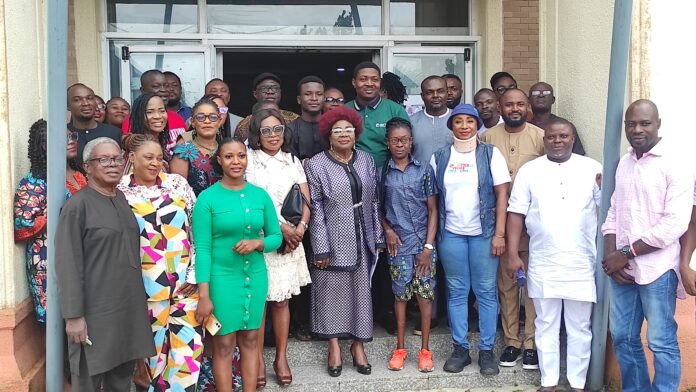Calabar – The Cross River State Ministry of Social Welfare and Community Development, in collaboration with the United Nations Children Fund (UNICEF), organized a two-day capacity strengthening workshop for Civil Society Organizations (CSOs) and Community-Based Organizations (CBOs) on the Cross River State Social Protection Policy. The event, held at Danic Hotel in Calabar beginning from Tuesday to end on Wednesday, aimed to equip these organizations with knowledge and skills to effectively implement the state’s social protection policy NEGROIDHAVEN can report.
In her opening remarks, Bishop Hon. (Dr.) Mrs. Margaret Ene-Ita, the Commissioner for Social Welfare and Community Development, highlighted the vital role of the informal sector, which includes civil society organizations, in the development of Cross River. She emphasized the historical collaboration between the government and CSOs and the essential complementary role they play in implementing government policies and programs at the grassroots level.
The Commissioner also underscored the importance of the newly developed Cross River State Social Protection Policy, aligned with the Federal Government’s Social Protection Framework. This policy aims to ensure that “no one is left behind” in the state’s development agenda. It is focused on meeting the needs of the most vulnerable, including those in remote areas.
Reflecting on the collaboration between the civil and public sectors, Ene-Ita said, ‘As a matter of fact, there was a time when Cross River State was the hub of most development partners because of the smooth relationship and collaboration that existed between government and the civil society. I want to assure you that those lofty days are here again.
‘In Collaboration with the United Nations Children Fund (UNICEF), Cross River State has developed a Social Protection Policy modelled after the Federal Government’s Social Protection Framework. This policy document has been launched and disseminated to members of the public. It has therefore become relevant that stakeholders are acquainted with this policy. As we all know, the People’s First Agenda of the Governor is aimed at taking governance to those who need it most and this is what social protection is about’, she said.

Hon. Helen Agan-Isamoh Egodo (Ph.D), the Commissioner for Humanitarian Affairs, also addressed the participants in a goodwill message. She stressed the significance of effective social protection programs in reducing social and economic disparities, empowering the vulnerable, and improving overall well-being. Commissioner Egodo encouraged active participation in the workshop, emphasizing the importance of advocacy and resource mobilization for successful social protection programming.
The theme of the workshop, “Public Finance Management Legislative Advocacy and Resource Mobilization for Effective Social Protection Programming in CRS,” reflects the need for collaboration among stakeholders to ensure the successful implementation of social protection programs. The workshop provided a platform for diverse expertise and perspectives to come together, fostering a more inclusive and just society in Cross River State.
Participants were encouraged to engage in thoughtful discussions and absorb the knowledge and skills offered during the workshop. It is expected that this training will empower them to advocate effectively for social protection programs that uphold the rights and well-being of the people of Cross River State.
The event exemplified the commitment of the Cross River State government to strengthen its partnership with CSOs and CBOs to address the needs of the most vulnerable members of society and ensure their inclusion in the state’s development initiatives.
‘This workshop implies a significant step forward in a collective mission to enhance the capacity of a CSO’s, CBO’s, NGOs and individuals in areas as crucial as this, bearing in mind the fact that social protection is a vehicle to improve social justice , Reduce social economic disparities among citizens in the states, reduce extreme poverty among the most deprived, empower the most vulnerable to reduce multidimensional poverty, and the impact of economic shocks, provide social welfare and improve security/nutrition, ensure that citizens have access to, and utilize basic social services and infrastructures’, she explained.
Present at the workshop are members of various CSOs, CBOs, civil servants and the media.










